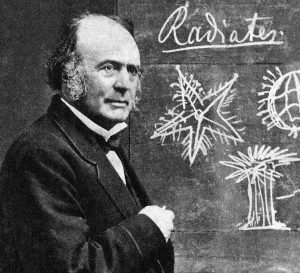Jean Louis Rodolphe Agassiz, a Swiss-American biologist and geologist recognized as an innovative and prodigious scholar of Earth’s natural history.
Biographical Overview
Born in Switzerland, 1807-1873 Biologist and Geologist Developed the Ice Age concept
Agassiz grew up in Switzerland, and studied and received Doctor of Philosophy and medical degrees at Erlangen and Munich, respectively. After further studies with Cuvier and von Humboldt in Paris, Agassiz proceeded with research leading to his appointment as professor of natural history at University of Neuchâtel.
After visiting Harvard University mid-career, he emigrated to the U.S. in 1847 and became a professor of zoology and geology at Harvard, and to head its Lawrence Scientific School and found its Museum of Comparative Zoology. Agassiz made extensive contributions to ichthyological classification (including of extinct species) and to the study of geological history (including to the founding of glaciology), and has become broadly known through study of his thorough regimen of observational data gathering and analysis. He made vast institutional and scientific contributions to zoology, geology, and related areas—including many multi-volume research series running to thousands of pages.
Fellow of the Royal Society, 1838
Awards
Wollaston Medal. 1836
Worldview
Using a biblical worldview perspective, Agassiz successfully applied the scientific method to investigate the laws of nature, His worldview is notable from what he said –
“The study of Nature is intercourse with the Highest Mind. You should never trifle with Nature.”
“Every scientific truth goes through three states: first, people say it conflicts with the Bible; next, they say it has been discovered before; lastly, they say they always believed it.”
“Facts are stupid until brought into connection with some general law.”
“I will frankly tell you that my experience in prolonged scientific investigations convinces me that a belief in God-a God who is behind and within the chaos of vanishing points of human knowledge-adds a wonderful stimulus to the man who attempts to penetrate into the regions of the unknown.”
“I sometimes hear preachers speak of the sad condition of men who live without God in the world, but a scientist who lives without God in the world seems to me worse off than ordinary men.”
Louis Agassiz


